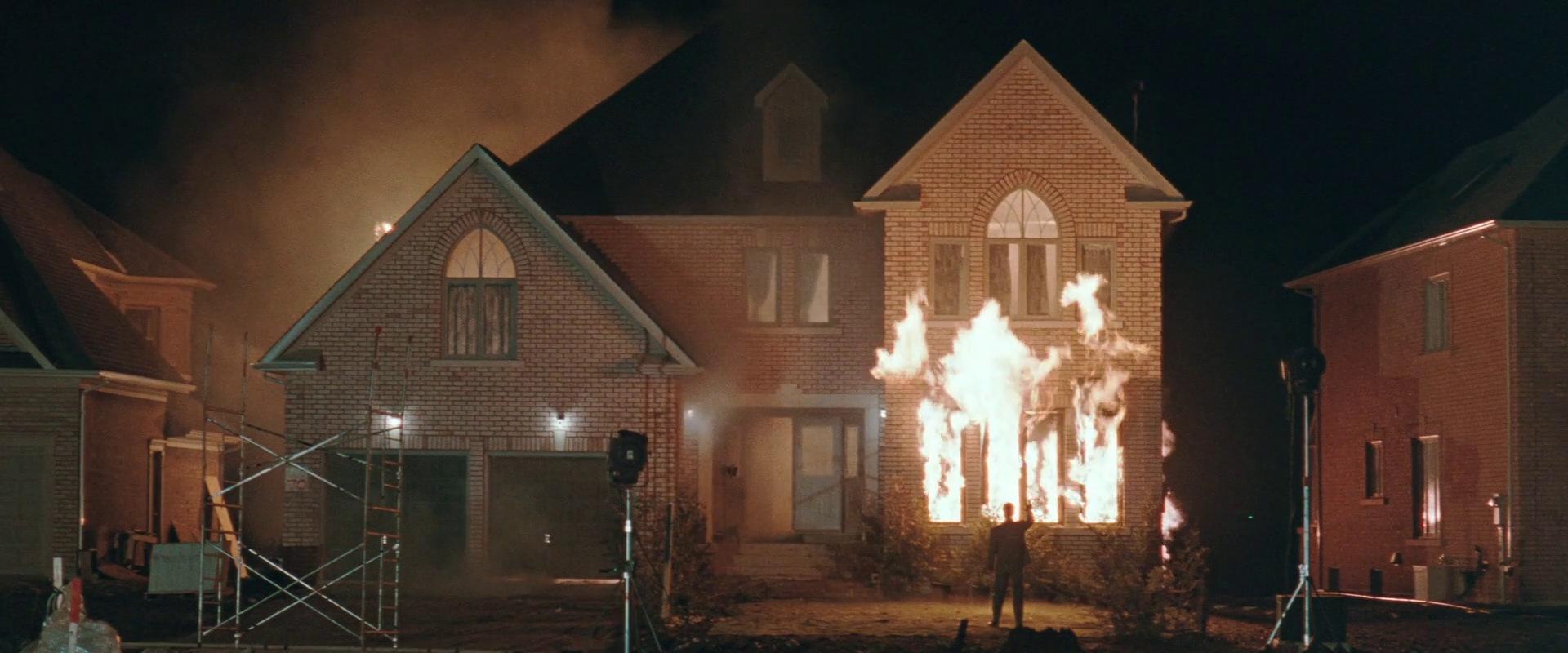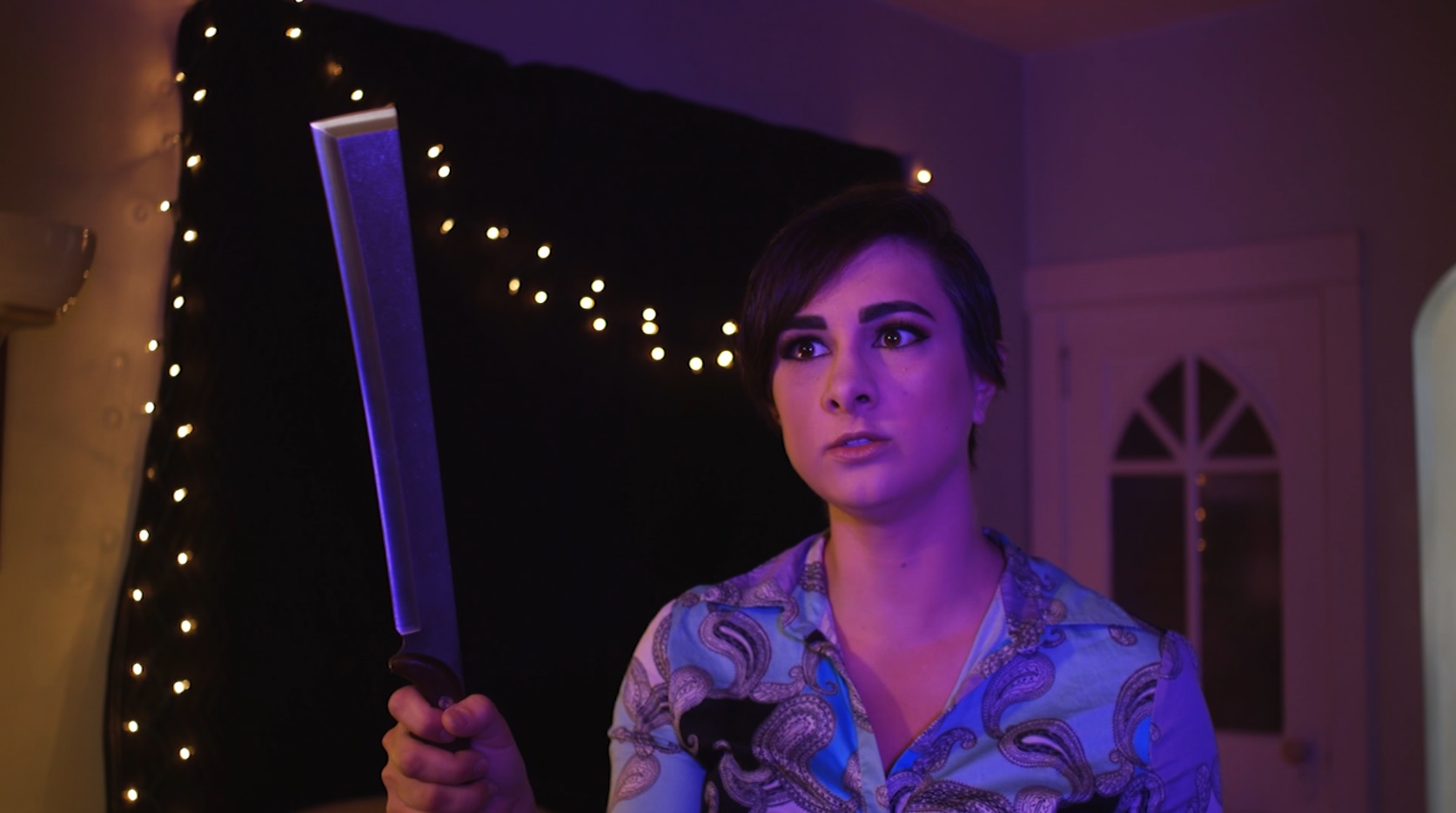Editorials
‘The Adjuster’ Is a Psychosexual Baptism by Fire [Maple Syrup Massacre]

Maple Syrup Massacre is an editorial series where Joe Lipsett dissects the themes, conventions and contributions of new and classic Canadian horror films. Spoilers follow…
It would be disingenuous to suggest that Atom Egoyan’s The Adjuster is a horror film.
Psychological thriller is more apt descriptor, though audiences seeking scary set pieces will walk away unsatisfied. Despite this, The Adjuster has a narrative of thriller tropes, including a large number of psychosexual relationships, characters adopting dual roles (or simply role playing) and an ending that encourages audiences to re-evaluate what they have seen.
Egoyan is one of Canada’s most significant contemporary directors, though internationally his work is known principally in art cinema and film festival circles. In the 90s, Egoyan was a symbol of national pride; he, along with David Cronenberg, was essentially the face of English-language Canadian film. His most famous film is the Sarah Polley-starring The Sweet Hereafter, which was nominated for two Oscars in 1998 (one for Best Director and one for Best Adapted Screenplay).
1991’s The Adjuster is his fourth film and the one that put him on the map as a significant talent to look out for.

Written and directed by Egoyan, the film stars Elias Koteas (Shutter Island) as Noah Render, an insurance adjuster who goes to great lengths for his job. He not only comforts the victims of house fires, he puts them all up in the same motel, and even sleeps with them (male and female).
Noah is married to Hera (Arsinée Khanjian, Egoyan’s real-life wife), an Armenian refugee who works as a film censor. Just as Noah has his own “private life,” so too does Hera: she covertly records the violent, sexual content of the films and screens them for her sister Seta (Rose Sarkisyan).
Then there’s rich married couple Bubba (Maury Chaykin, Of Unknown Origin) and Mimi (Gabrielle Rose, Grace), whose lives are seemingly dedicated to kinky role playing. They’re introduced on the subway, where Hera sees Mimi use Bubba, who is dressed as an unhoused, mentally-ill man, to finger herself in public. Later Mimi dresses as a cheerleader who is ravaged by football players while her cuck husband films the encounter.
Although the film has a unhurried, dream-like plot, the lives of these characters become intertwined when Bubba happens upon the Render house and asks to rent it for a week to film another salacious film with his wife. This displaces Noah, Hera, their young son and Seta, forcing them to move into the motel alongside all of his clients.

Written out in this form, The Adjuster reads like a cross between a porno and sex, lies and videotape, but like Egoyan’s other films, it is really about the secret lives of extremely damaged people. Tragedy looms large over nearly every character and while there is a certain amount of sex, the sexual interactions – much like the lies the characters tell – are a form of trauma-response. Characters struggle deeply to connect, often resorting to films or sex rather than words to negotiate their relationships with others.
These are common themes within Egoyan’s work: his films are filled with characters who adopt a false identity in order to seek out connections, all the while holding the truth (and therefore genuine relationships) at arm’s length. Canadian film scholar Tom McSorley even wrote an entire book on The Adjuster’s place within the history of Canadian film, as well as its use of “intimacy and detachment” to advance its thematic interests.
Tellingly, The Adjuster is set in an unnamed Canadian location. The world of the film is populated entirely by non-descript locations: the Render home is actually a model home in an empty tract of suburbia, abandoned when the developer went broke. The survivors of the fires that Noah works and sleeps with are all put up in a generic motel and Hera’s censor job takes place in an innocuous theater within a cavernous non-descript archive.
McSorley reads the lack of identifiers in the film as, in part, a reflection of the Canadian film funding model. At the time funding was available at both the provincial (Ontario Film Development Corporation) and federal (Canadian Film Development Corporation) level. Both agencies were incentivizing filmmakers to make work that was more commercial in order to sell films internationally, which was essentially code-speak for “remove the Canadian references” such as geographical and cultural specificity.

Situating the film in these liminal spaces reinforce its themes and character arcs, particularly the deconstruction of role-play and simulation. When The Adjuster ends with a startling reveal that recontextualizes who Noah is, it works because he and the other characters don’t seem to live in the real world. The result is a haunting meditation on the struggle to connect to others; characters are instead caught in a cyclical baptism of fire, role-play, mediated video, and shimmering memories of violence.
The Adjuster may not be a straightforward horror film, but it feels distinctly genre-adjacent in the way audiences describe A24 and NEON films. Fans who have exhausted the weird sex and chilly aesthetics of Cronenberg would do well to check out Egoyan for their next fix.

Editorials
Silly, Self-Aware ‘Amityville Christmas Vacation’ Is a Welcome Change of Pace [The Amityville IP]

Twice a month Joe Lipsett will dissect a new Amityville Horror film to explore how the “franchise” has evolved in increasingly ludicrous directions. This is “The Amityville IP.”
After a number of bloated runtimes and technically inept entries, it’s something of a relief to watch Amityville Christmas Vacation (2022). The 55-minute film doesn’t even try to hit feature length, which is a wise decision for a film with a slight, but enjoyable premise.
The amusingly self-aware comedy is written and directed by Steve Rudzinski, who also stars as protagonist Wally Griswold. The premise is simple: a newspaper article celebrating the hero cop catches the attention of B’n’B owner Samantha (Marci Leigh), who lures Wally to Amityville under the false claim that he’s won a free Christmas stay.
Naturally it turns out that the house is haunted by a vengeful ghost named Jessica D’Angelo (Aleen Isley), but instead of murdering him like the other guests, Jessica winds up falling in love with him.

Several other recent Amityville films, including Amityville Cop and Amityville in Space, have leaned into comedy, albeit to varying degrees of success. Amityville Christmas Vacation is arguably the most successful because, despite its hit/miss joke ratio, at least the film acknowledges its inherent silliness and never takes itself seriously.
In this capacity, the film is more comedy than horror (the closest comparison is probably Amityville Vibrator, which blended hard-core erotica with references to other titles in the “series”). The jokes here are enjoyably varied: Wally glibly acknowledges his racism and excessive use of force in a way that reflects the real world culture shift around criticisms of police work; the last names of the lovers, as well the title of the film, are obvious homages to the National Lampoon’s holiday film; and the narrative embodies the usual festive tropes of Hallmark and Lifetime Christmas movies.
This self-awareness buys the film a certain amount of goodwill, which is vital considering Rudzinski’s clear budgetary limitations. Jessica’s ghost make-up is pretty basic, the action is practically non-existent, and the whole film essentially takes place in a single location. These elements are forgivable, though audiences whose funny bone isn’t tickled will find the basic narrative, low stakes, and amateur acting too glaring to overlook. It must be acknowledged that in spite of its brief runtime, there’s still an undeniable feeling of padding in certain dialogue exchanges and sequences.

Despite this, there’s plenty to like about Amityville Christmas Vacation.
Rudzinski is the clear stand-out here. Wally is a goof: he’s incredibly slow on the uptake and obsessed with his cat Whiskers. The early portions of the film lean on Wally’s inherent likeability and Rudzinski shares an easy charm with co-star Isley, although her performance is a bit more one-note (Jessica is mostly confused by the idiot who has wandered into her midst).
Falling somewhere in the middle are Ben Dietels as Rick (Ben Dietels), Wally’s pathetic co-worker who has invented a family to spend the holidays with, and Zelda (Autumn Ivy), the supernatural case worker that Jessica Zooms with for advice on how to negotiate her newfound situation.
The other actors are less successful, particularly Garrett Hunter as ghost hunter Creighton Spool (Scott Lewis), as well as Samantha, the home owner. Leigh, in particular, barely makes an impression and there’s absolutely no bite in her jealous threats in the last act.
Like most comedies, audience mileage will vary depending on their tolerance for low-brow jokes. If the idea of Wally chastising and giving himself a pep talk out loud in front of Jessica isn’t funny, Amityville Christmas Vacation likely isn’t for you. As it stands, the film’s success rate is approximately 50/50: for every amusing joke, there’s another one that misses the mark.
Despite this – or perhaps because of the film’s proximity to the recent glut of terrible entries – Amityville Christmas Vacation is a welcome breath of fresh air. It’s not a great film, but it is often amusing and silly. There’s something to be said for keeping things simple and executing them reasonably well.
That’s a lesson that other indie Amityville filmmakers could stand to learn.


The Amityville IP Awards go to…
- Recurring Gag: The film mines plenty of jokes from characters saying the quiet part (out) loud, including Samantha’s delivery of “They’re always the people I hate” when Wally asks how he won a contest he didn’t enter.
- Holiday Horror: There’s a brief reference that Jessica died in an “icicle accident,” which plays like a perfect blend between a horror film and a Hallmark film.
- Best Line: After Jessica jokes about Wally’s love of all things cats to Zelda, calling him the “cat’s meow,” the case worker’s deadpan delivery of “Yeah, that sounds like an inside joke” is delightful.
- Christmas Wish: In case you were wondering, yes, Santa Claus (Joshua Antoon) does show up for the film’s final joke, though it’s arguably not great.
- Chainsaw Award: This film won Fangoria’s ‘Best Amityville’ Chainsaw award in 2023, which makes sense given how unique it is compared to many other titles released in 2022. This also means that the film is probably the best entry we’ll discuss for some time, so…yay?
- ICYMI: This editorial series was recently included in a profile in the The New York Times, another sign that the Amityville “franchise” will never truly die.
Next time: we’re hitting the holidays in the wrong order with a look at November 2022’s Amityville Thanksgiving, which hails from the same creative team as Amityville Karen <gulp>













You must be logged in to post a comment.